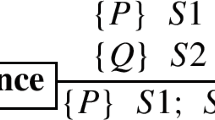
Overview
- Deals with the verification of programs allowing dynamic process creation
- Includes four new chapters on increasingly important aspects of programming
- Contains many learning tools to aid the reader such as case studies, exercises, comprehensive references/further reading and helpful appendices
Part of the book series: Texts in Computer Science (TCS)
Access this book
Tax calculation will be finalised at checkout
Other ways to access
About this book
Similar content being viewed by others
Keywords
Table of contents (12 chapters)
-
Front Matter
-
In the Beginning
-
Front Matter
-
-
Deterministic Programs
-
Front Matter
-
-
Parallel Programs
-
Front Matter
-
-
Nondeterministic and Distributed Programs
-
Front Matter
-
-
Back Matter
Reviews
"The Third Edition is an excellent new version of a valuable book. Enhanced with new material on recursion and object-oriented programs, this book now covers methods for verifying sequential, object-oriented, and concurrent programs using well-chosen sample programming languages that highlight fundamental issues and avoid incidental complications. With growing challenges today to produce correct software systems for the future, this book lets students wisely use a few months now to master concepts that will last them a lifetime." (John C. Mitchell, Stanford University)
"Verification of programs is the Holy Grail of Computer Science. This book makes its pursuit seem both pleasant and worthwhile. Its unique strength lies in the way the authors have deconstructed the apparently complex subject such that each piece carries exactly one idea. The beauty of the presentation extends from the overall structure of the book to the individual explanations, definitions and proofs." (Andreas Podelski, University of Freiburg)
"Program verification became an interesting research topic of computing science about forty years ago. Research literature on this topic has grown quickly in accordance with rapid development of various programming paradigms. Therefore it has been a challenge to university lecturers on program verification how to carefully select an easy but comprehensive approach, which can fit in with most programming paradigms and can be taught in a systematic way. The publication of this book is an answer to the challenge, and to my knowledge quite many university lecturers have been influenced by the earlier editions of this book if not chosen them as textbook. Given that the third edition includes verification of object-oriented programs – the most fashionable programming paradigm, and presents it in a way coherent with the approach adopted by the earlier ones, we can expect a further impact of the new edition on university teachings." (ZhouChaochen, Chinese Academy of Sciences, Beijing)
Authors and Affiliations
Bibliographic Information
Book Title: Verification of Sequential and Concurrent Programs
Authors: Krzysztof R. Apt, Frank S. Boer, Ernst-Rüdiger Olderog
Series Title: Texts in Computer Science
DOI: https://doi.org/10.1007/978-1-84882-745-5
Publisher: Springer London
eBook Packages: Computer Science, Computer Science (R0)
Copyright Information: Springer-Verlag London Limited 2009
Hardcover ISBN: 978-1-84882-744-8Published: 05 October 2009
Softcover ISBN: 978-1-4471-2513-6Published: 14 March 2012
eBook ISBN: 978-1-84882-745-5Published: 18 September 2009
Series ISSN: 1868-0941
Series E-ISSN: 1868-095X
Edition Number: 3
Number of Pages: XXIV, 502
Number of Illustrations: 26 b/w illustrations
Additional Information: Originally published in the series: Graduate Texts in Computer Science
Topics: Logics and Meanings of Programs, Mathematical Logic and Formal Languages, Algorithm Analysis and Problem Complexity



